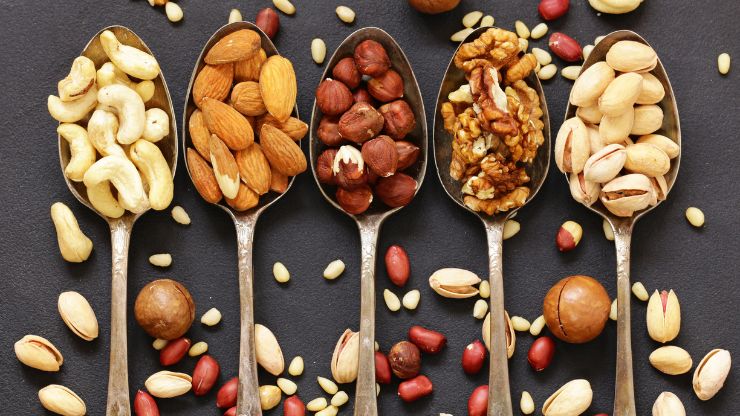Health Advantages of Pine Nuts – Pine nuts, the edible seeds of pine trees, have gained recognition not only for their distinctive flavor but also for their impressive array of health benefits. Packed with essential nutrients, including healthy fats, proteins, vitamins, and minerals, pine nuts contribute to overall well-being.
This introduction aims to explore the multifaceted advantages of incorporating pine nuts into one’s diet. From promoting cardiovascular health through the influence on cholesterol levels to aiding weight management by inducing a sense of satiety, these small yet powerful seeds offer a nutritional profile that extends to eye health, blood sugar regulation, bone strength, and cognitive function.
As we delve into the myriad benefits of pine nuts, it becomes evident that their inclusion in a balanced diet can be a flavorful and nutritious step toward fostering a healthier lifestyle.
Health Advantages of Pine Nuts
Rich in Nutrients
Pine nuts are nutrient-dense, providing essential vitamins such as E, K, and various B-vitamins. Packed with minerals like magnesium, potassium, and zinc, they contribute to overall well-being. These tiny seeds support heart health by offering monounsaturated and polyunsaturated fats that help lower bad cholesterol.
With pinolenic acid, they aid weight management by promoting a sense of fullness. Rich in antioxidants, including vitamin E, pine nuts combat oxidative stress, benefiting cell health. Lutein in pine nuts supports eye health, while dietary fiber aids digestion and prevents constipation.
Their energy-boosting combination of healthy fats, proteins, and carbohydrates provides sustained vitality. Pine nuts’ anti-inflammatory properties and essential nutrients, like zinc, can enhance brain function, and minerals such as magnesium and phosphorus contribute to robust bone health.
Also, Read – Types of Fish to Eat
Heart Health

Pine nuts promote heart health with a blend of monounsaturated and polyunsaturated fats that help lower bad cholesterol levels. These fats contribute to cardiovascular well-being.
Additionally, the seeds contain antioxidants, such as vitamin E, which combat oxidative stress and support overall heart function. Including pine nuts in your diet may contribute to a heart-healthy lifestyle, potentially reducing the risk of cardiovascular issues.
As with any dietary consideration, it’s essential to maintain balance and consult with healthcare professionals for personalized advice.
Weight Management

Pine nuts aid weight management due to their content of pinolenic acid, a fatty acid that may suppress appetite and induce a feeling of fullness. Despite being calorie-dense, the inclusion of pine nuts in a balanced diet can contribute to weight control.
The seeds provide a satisfying mix of healthy fats, proteins, and carbohydrates, offering sustained energy and potentially reducing the likelihood of overeating.
However, moderation is crucial, and incorporating pine nuts as part of a well-rounded, calorie-conscious diet can be a beneficial component of a weight management strategy. Individual responses may vary, and consultation with healthcare professionals is advisable for personalized advice.
Antioxidant Properties
Pine nuts boast antioxidant properties, primarily attributed to their high content of vitamin E. These antioxidants play a vital role in protecting cells from oxidative stress, which is associated with various chronic diseases and aging.
The presence of these compounds in pine nuts contributes to overall health by neutralizing free radicals in the body. Incorporating pine nuts into your diet can be a tasty way to enhance your antioxidant intake and support cellular well-being. However, it’s essential to maintain a balanced diet with a variety of nutrient-rich foods for comprehensive health benefits.
Also, Read – Deliciously Cheesy Veggie Side Dishes
Eye Health

Pine nuts support eye health with the presence of lutein, a carotenoid known for its benefits in preventing age-related macular degeneration and maintaining overall eye function. Lutein in pine nuts acts as a protective antioxidant, shielding the eyes from oxidative stress.
Including pine nuts in your diet can contribute to maintaining healthy vision and may play a role in preventing certain age-related eye disorders.
As part of a well-rounded diet, rich in a variety of nutrients, pine nuts offer a tasty addition that supports overall eye health. However, individual dietary needs and eye health considerations may vary, so consulting with eye care professionals is advisable.
Boosted Energy
Pine nuts provide a natural energy boost, containing a combination of healthy fats, proteins, and carbohydrates. This nutrient profile supports sustained energy release throughout the day. The seeds’ caloric density, though higher, contributes to a feeling of fullness and satiety, potentially preventing overconsumption.
Incorporating pine nuts into meals or snacks can be a flavorful way to enhance vitality without causing energy spikes and crashes. While moderation is key due to their calorie content, the nutrient-rich composition of pine nuts makes them a valuable addition to a balanced diet, supporting overall energy levels and nutritional needs. Individual responses to foods may vary, so consulting with healthcare professionals is recommended.
Improved Digestion
Pine nuts promote improved digestion with their rich dietary fiber content. Fiber is essential for maintaining a healthy digestive system by regulating bowel movements and preventing constipation.
Including pine nuts in your diet can contribute to a well-balanced fiber intake, supporting the overall health of the digestive tract. The fiber in pine nuts adds bulk to the stool, promoting efficient movement through the digestive system.
This can aid in preventing digestive issues and promoting regularity. However, it’s important to consume pine nuts as part of a varied and balanced diet to ensure comprehensive digestive health. Individual responses to dietary fiber may vary, so consulting with healthcare professionals is advisable.
Anti-Inflammatory Effects
Pine nuts exhibit anti-inflammatory effects attributed to their content of antioxidants and polyphenols. These compounds work to counteract inflammation, a factor linked to various health issues.
Regular consumption of pine nuts may contribute to reducing chronic inflammation in the body. The anti-inflammatory properties can be beneficial in mitigating the risk of inflammatory conditions.
However, it’s important to incorporate pine nuts as part of a well-rounded, anti-inflammatory diet that includes a variety of nutrient-rich foods. While individual responses to dietary components vary, consulting with healthcare professionals can provide personalized advice on managing inflammation and promoting overall health.
Enhanced Brain Function

Pine nuts support enhanced brain function with essential nutrients like zinc and magnesium. These minerals play a crucial role in cognitive processes. Additionally, the monounsaturated fats in pine nuts contribute to overall brain health.
Including pine nuts in your diet may aid in maintaining cognitive function and supporting neural pathways. While not a standalone solution, the combination of nutrients in pine nuts, as part of a balanced diet, can contribute to optimal brain health. Individual responses to dietary factors vary, so consulting with healthcare professionals is advisable for personalized advice on promoting cognitive well-being.
Bone Health
Pine nuts contribute to bone health through their mineral content, including magnesium and phosphorus. These minerals play a vital role in the development and maintenance of strong and healthy bones.
Magnesium supports bone density, while phosphorus is a key component of bone structure. Including pine nuts in your diet can complement a well-rounded approach to bone health.
However, it’s essential to maintain a diet rich in various nutrients and engage in weight-bearing exercises for comprehensive bone support. Individual dietary needs and bone health considerations may vary, so consulting with healthcare professionals is recommended for personalized advice.
Conclusion
In conclusion, the health advantages of pine nuts are both diverse and compelling. From supporting heart health to aiding in weight management and bolstering cognitive function, these nutrient-rich seeds offer a holistic approach to well-being.
With their delicious taste and nutritional density, incorporating pine nuts into daily meals represents a simple yet impactful choice for those seeking to enhance their overall health.
As we savor the unique flavor of pine nuts, we simultaneously embrace a spectrum of benefits that contribute to a healthier and more vibrant lifestyle.
FAQs
The monounsaturated and polyunsaturated fats, along with omega-3 fatty acids in pine nuts, may help lower cholesterol levels, potentially reducing the risk of heart disease.
Yes, pine nuts may contribute to weight management by inducing a sense of satiety, curbing appetite, and offering a nutrient-dense option with relatively lower calories.
Pine nuts contain lutein and zeaxanthin, which are beneficial for eye health, potentially protecting against age-related macular degeneration and supporting overall vision.






